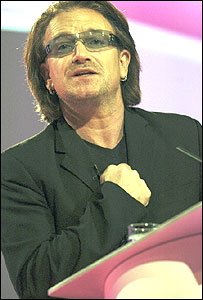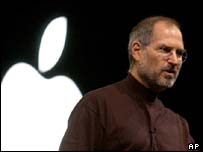As Apple tries to keep the iPod at the head of the digital music player pack, technology analyst Bill Thompson wonders whether they are playing fair.

Will Bono have a quiet work with Mr Jobs?
|
 Music fans with a particular interest in the pomp-rock experimentation of U2 are salivating at the news that Bono and The Edge will be appearing with Apple's Steve Jobs at a PR event in California on Tuesday.
Music fans with a particular interest in the pomp-rock experimentation of U2 are salivating at the news that Bono and The Edge will be appearing with Apple's Steve Jobs at a PR event in California on Tuesday.
The latest rumour to reach me, via my ultra-wired friend Simon, is that we will be able to purchase a special edition black iPod preloaded with some of the band's back catalogue and their newest album.
Presumably the black buttons on the case will light up black to show they have been pressed, for that super-cool look.
Other rumours range from a colour-screen iPod that can show photos, to a low-cost version using flash memory instead of an expensive hard drive.
It is all clear evidence that Apple can feel the competition breathing down their neck.
Opening up
Dell, Archos, Sony and many others are coming up with devices that can match the iPod's performance and looks, but have better battery life and support a wider range of music file formats.
And iRiver continues to appeal to the open source community, with support for Ogg Vorbis and more flexibility.
They constantly surprise me with the imagination that goes into their products. If I had not already bought my shiny toy from Apple, I would be shopping for one of their high-end players by now.
But I do like my iPod.
I like it because it is a well-designed, functional piece of technology that has given me access to my entire music collection whenever I want it, with a simple user interface and good sound quality.
 |
 Unsigned bands like The Burns Unit seem to have realised that making their music freely available is a way to build a following and even generate CD sales
Unsigned bands like The Burns Unit seem to have realised that making their music freely available is a way to build a following and even generate CD sales

|
I like it because it lets me listen to Evanescence as I write this on the train. My daughter introduced me to the band but the iPod has given me the chance to listen to them a lot, and discover how good they are.
The other day I was humming an old pop song as I walked to a meeting, and I found to my delight that I had inadvertently copied it as part of a greatest hits compilation, a form of serendipity that I have named "serenpodity".
It was, I am embarrassed to admit, Baby I Don't Care by Transvision Vamp.
Yet there are signs that Apple may be in the process of doing the same sort of damage to its reputation and market share with the iPod and iTunes Music Store as it did with the Apple II and Mac back in the 1980s.
That was when it refused to license its technology and left the field open for the IBM PC and Microsoft to take over.
US users of iTunes software who connect to the music store are being told that they must upgrade to the latest version, 4.6, or they will no longer be able to buy songs.
And newer versions of both the software and of the music store service are expected imminently.
This sort of upgrade is not in itself a problem. New functions require new software, and sometimes it does not make sense to support old versions.
MSN Messenger, for example, was upgraded earlier this year to fix a raft of security holes.
If the new iTunes offers improved usability and new options then that would be great.
But in the past Apple has upgraded iTunes in order to limit the number of times a playlist can be burned to CD or restrict what can be done with copy-protected files.
These changes can be seen as a way of keeping the record companies happy.
Locked in?
Yet unsigned bands like The Burns Unit seem to have realised that making their music freely available is a way to build a following and even generate CD sales.
It seems very likely that one of the changes that will be made in the new version of iTunes will stop files that have been bought from Real's Harmony service from playing.
Real caused a stir back in July when they announced that you could buy copy-protected files from them and convert them to Apple's Fairplay digital rights management system so that iTunes would recognise them.

Jobs, The Edge and Bono will take the stage
|
Apple threatened legal action, but went quiet when it was pointed out that adding digital rights management is not actually a breach of the US Digital Millennium Copyright Act.
They then threatened to take their ball away by changing iTunes and the iPod software so that it no longer worked with Harmony.
This would mean that iPod owners would not be able to listen to songs they bought from Real on their players.
As far as I can see, this would help Apple retain its hold on the digital music market.
When Microsoft do this sort of stuff with web browsers they get roundly criticised for seeking to lock in their customers and remove freedom of choice. Apple could be criticised on the same grounds.
It will not affect me, as I do not buy DRM-protected music from anywhere, preferring low-cost CDs that I can copy myself.
But Apple's behaviour is bad for the market, bad for the future of digital music and may harm Apple's reputation. Maybe The Edge can have a word with Steve Jobs.
Bill Thompson is a regular commentator on the BBC World Service programme Go Digital.

